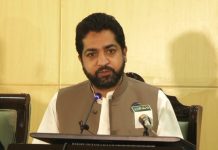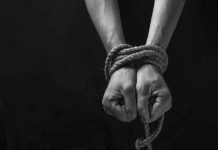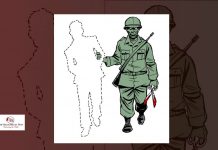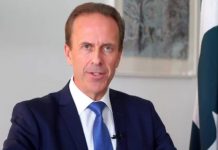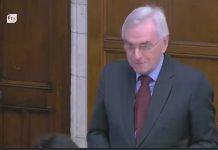Thousands of admirers within and without Balochistan have taken to the social media to commemorate the 14th death anniversary of Nawab Akbar Bugti, a tribal chieftain, former governor and the 6th chief minister of Balochistan, who was killed by the Pakistani military on Dec. 26, 2006, in Kohlu, Balochistan.
According to the details, thousands of admirers took to the social media to pay homage to Nawab Bugti on his 14th death anniversary on Wednesday, remembering him as the ‘charismatic leader of Balochistan’ and addressing him as the ‘father of the nation.’
Brahumdagh Bugti, Nawab Bugti’s grandson, said that the situation in Balochistan has got worse since Bugti’s death. Talking to WION, Brahumdagh said that the ‘independence movement’ in Balochistan has got more momentum and international attention. International platforms, human rights activists and even the United Nations is highlighting the human rights abuses in Balochsitan, he said.
He further said that only Baloch can decide what happens in their land, not a second party based in Islamabad or Beijing. He said that the people are dying en masse in Balochistan; our resources are plundered and then redistributed in other communities. India can pressurize Pakistan to refrain from torture, bloodshed, violence and human rights violations in Balochistan. India helped liberate Bangladesh in ‘71, “why India cannot help Balochistan?” he questioned.
Mohsin Dawar, the member of the Pakistani National Assembly and a leader of the Pashtun Tahaffuz Movement, remembered Nawab Bugti in a tweet, saying: “The murder of#ShaheedNawabAkbarBugti shows the vulnerability of those who challenge the Establishment. His stature didn’t matter & neither did the consequences of his murder for this country, all that mattered was the ego of a General who left the country after retirement.”
Baloch Republican Party, a pro-independence party headed by Brahumdagh Bugti, conducted a virtual seminar in Germany to commemorate the death anniversary of Nawab Akbar Bugti. Activists, intellectuals, writers and politicians addressed the seminar, including Parvez Hoodbhoy, Gulalai Islmail, Sher Muhammad Bugti, Afrasiab Khattak, Muhammad Taqi, Farhatullah Babar, Gul Bukhari and several others. The speakers unanimously paid tribute to Nawab Bugti and said that the establishment can kill an individual, but no an ideology and a nation.
Sohrab Baloch, the chairman of the Baloch Students Organization Azad, tweeted: “This day marks the 14th martyrdom anniversary of Nawab Akbar Bugti who selflessly dedicated himself to fight for the liberation of our people. He shows us what unyielding courage, determination, redemption & grace is. He was the embodiment of discipline & courage
Manzoor Pashteen, the leader of the Pashtun Tahaffuz Movement, tweeted: “The brutal killing of Baloch politician Akbar Bugti tells alot about the mindset of inherited ruling elite of Pakistan & their perception about ethnic minorities. State violence in peripheries is institutionalized like what happened with Hayat Baloch.”
Nida Kirmani, a sociologist and researcher, remembered Nawab Bugti in these words: “Fourteen years ago today, the military dictator Pervez Musharraf ordered the murder of a respected political leader, Nawab Akbar Bugti, & bragged about it openly. His murder alienated the Baloch population further & gave fuel to an insurgency that claimed countless lives.”
Who was Nawab Akbar Bugti?
Nawab Akbar Bugti – better known as Nawab Bugti – was the chieftan of the Bugti tribe, the 4th governor and 6th chief minister of Balochistan, a veteran leader and supporter for the independence of Balochistan. With a twirling moustache, thick white beard, prominent six-feet-tall stature, smooth gait and the unbending backbone, Bugti was the epitome of the Baloch nationalists.
In 2005, Nawab Bugti presented a 15-point agenda to the Pakistani government, then led by the military dictator Parvez Musharraf. His demands included a moratorium on the construction of military garrisons, a greater control of Balochistan’s resources, among other things. The government didn’t comply, but in the meantime, the tensions in Balochistan escalated. In 2005, Shazia Khalid, a doctor, was raped allegedly by the Pakistani army officers in a highly guarded security compound in Sui, Dera Bugti. She was then sedated and illegally detained by the authorities, reportedly to whitewash the incident. When the news broke out, the Bugti tribe, led by Nawab Bugti, was infuriated. Protests were organized throughout Balochistan, demanding immediate punishment for the culprits and justice for Shazia Khalid.
Parvez Musharraf, then the President of Pakistan, sent thousands of troops in Balochistan to squelch the uprising, only to further exacerbate the situation. Confrontations precipitated between the demonstrators and the forces in various cities that left tens of people injured. This period, some argue, marked the inception of the fifth and longest-running insurgency in Balochistan.
As the Pakistan security forces flooded the cities, incidents of violence surged. Nawab Bugti’s hometown, Dera Bugti, was besieged and his house was attacked, prompting him to recede into the mountains.
Mystery still surrounds Bugti’s death. Major General Shaukat Sultan Khan, the then Director General of the Inter-Services Public Relations, told media that the forces tried to enter the cave to ‘negotiate with Akbar Bugti’, not to kill or harm him. But as the forces approached the cave, a ‘blast of undetermined origin’ took place, bring the cave down and killing all the occupants at once, including Nawab Bugti. Several of the forces’ personnel also died in the incident. The DG ISPR claimed that no confrontation had preceded the ‘mysterious’ explosion that resulted in the collapse of the cave.
Many argue that no official order was given to kill or apprehend Nawab Bugti. Some analysts even deny the Pakistani army’s account of the incident, saying that a confrontation broke out between the insurgents and the forces that led to the collapse of the cave and the death of Nawab Bugti.
After days of searching, the dead body of Nawab Bugti was finally found, pinned under a boulder. He was reportedly identified by his Rolex wristwatch and his glasses, which were presented to the journalists. His coffin was sealed, and the authorities did not allow anyone to see his face, reasoning that it was ‘illegal.’ He was buried in his hometown, Dera Bugti, against the wishes of his family who wanted him to be buried in Quetta. The government officials said that the decision to bury him in Dera Bugti was necessary to avoid protests, demonstrations or any other uprisings throughout the provincial capital.
Nawab Bugti’s death left a profound impact on Balochistan; it sharpened the fifth wave of insurgency in Balochistan that is still going on. Thousands of people throughout Balochsitan took the roads to condemn the incident and demand justice. Parvez Musharraf distanced himself from Nawab Bugti’s death, saying that he had not authorized it, but argued that it was the right thing to do. In July 2012, the anti-terrorism court in Sibi, Balochistan, issued the arrest warrant of Parvez Musharraf, several other high-ranking military officials and senior members of the administration, including Jam Muhammad Yousaf, Shaukat Aziz, Aftab Sherpao and few others reportedly for their involvement in the killing of Nawab Akbar Bugti. Musharraf was formally arrested in June 2013, but was later released on bail.
Nawab Bugti was the ‘symbol of resistance’ for the people of Balochistan. Therefore, since his death in 2006, his admirers commemorate his death anniversary every year on 26 August.











